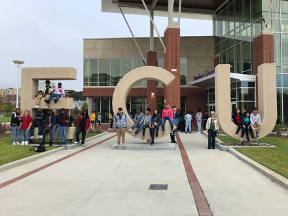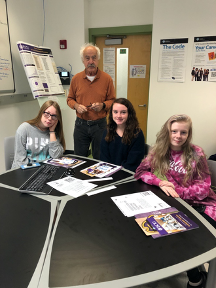This document is a supplement to the 2019-2020 (third year) annual report. It is organized according to the applicable project goals.
Goal 1: Transform programmatic-centric computer science education approach to a systems-oriented and software engineering-centric one.
- Involved five undergraduate students in Virtual Reality research. This work resulted in a research publication: Rui Wu, Jeevitha Pandurangaiah, Grayson Morgan Blankenship, Christopher Xavier Castro, Shanyue Guan, Andrew Ju, and Zhen Zhu (2020). Evaluation of Virtual Reality Tracking Performance for Indoor Navigation, In Proceedings of IEEE/ION Position Location and Navigation Symposium.

A K-12 teacher experiencing Virtual Reality application developed by the ECU NSF RED project team.
- Used active learning activities, team-based final project assignments, and problem-based learning activities in the following undergraduate courses: CSCI 2400, CSCI 3030, CSCI 3675, CSCI 3700, CSCI 4120, CSCI 4140, and CSCI 4710.
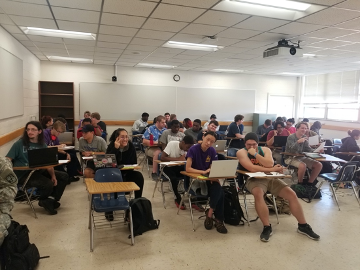
Students engaged in active learning activities in CSCI 2400 class in Fall 2019.
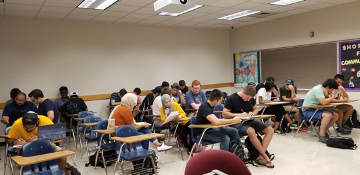
Students engaged in active learning activities in CSCI 3700 class in Fall 2019.
Goal 2: Infuse professional skills development process into the entire curriculum.

The ECU PPSE RED project team presents a poster at the ECU College of Engineering and Technology (CET) Research Day 2020.
-
Our focus on professional skills includes both personal and technical skills. The technical skills portion focuses on using tools and techniques that are currently used in industry, ensuring that our students are properly prepared when they go into the workforce. We designed and implemented hands-on activities in courses (e.g., CSCI 3030, CSCI 3675, CSCI 4140) to help students gain professional tools and techniques, including GitLab, Google’s cloud platform, and Jupyter notebooks shared via Google Colab. This work resulted in a conference publication (in press): 32nd IEEE International Conference on Software Engineering Education & Training (CSEE&T 2020).
-
Disseminated professional skills developmental materials at the following events: ASEE 2019 conference, FIE 2019 conference, and the 2019 NSF RED PI meeting. Also, as a poster at the CET Research Day 2020.
-
The ECU NSF RED project team organized five computer science seminars with presenters from academia and industry (Nvidia). The seminars were well attended by students and faculty members. Students were exposed to real-world research problems and scientific solutions. Students also observed and reflected on how to make professional presentations to a general audience.
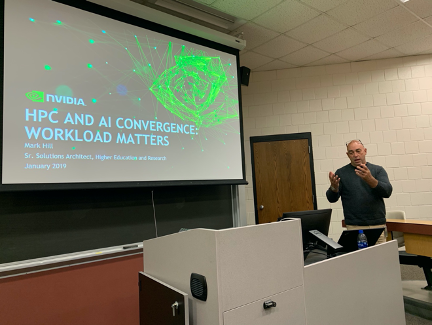
The ECU PPSE RED project team organized a seminar with a speaker from Nvidia.
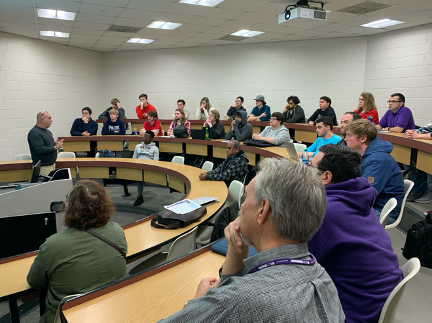
The ECU PPSE RED project team organized seminars were well attended by students.
Goal 3. Dramatically increase retention and graduation rates.
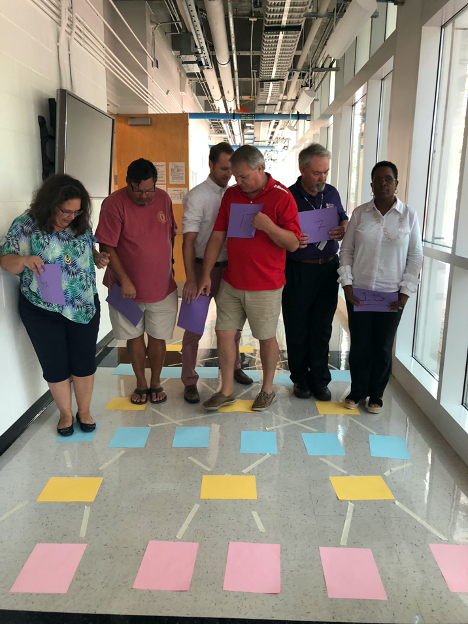
K-12 teachers working on a sorting activity at a workshop hosted by Computer Science faculty at ECU (Summer 2019).
-
The ECU NSF RED project team was engaged in an investigation to determine what computer science education secondary school students received prior to entering ECU and declaring their computer science major. In the summer of 2019, we recruited a team of 10 middle and high school teachers to engage in a learning community to investigate this.
-
August 8 - 9, 2019, we hosted a 2-day professional development (PD) at ECU for the teachers to learn and practice computer science pedagogies. Two `active learning’ exercises were conducted with the teachers to introduce ideas for more effective ways to teach computer science. At the conclusion of the workshop each teacher was provided a Raspberry Pi V4 to take back to their class. Teachers were asked to provide feedback on ways in which they used the Pi in their classroom.
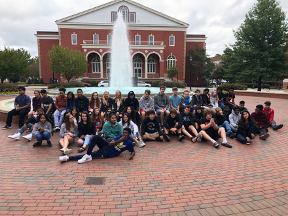
Middle School students visit the ECU computer science department (Fall 2019).
-
In the fall of 2019, the ECU NSF RED grant sponsored a one-day field trip for middle school and high school students to ECU’s campus and the computer science department. Middle and high school students attended the event along with accompanying teachers. Presentations on robotics, digital ethics, Raspberry Pi, Association for Computing Machinery and Women in Technology were made to K-12 students by, in most cases, ECU computer science students.
-
Spring 2020 activities were interrupted by the COVID-19 pandemic. This work continued with two webinars. At these webinars, teachers and ECU team members discussed the fact the national Computer Science Standards are under public review and will be released to school in the near future. Also, it was evident that teachers that have support from their principals had high enrollment in their courses and were teaching CS at higher levels than those that had little or no support from their principals.
-
We found that it is fundamental to empower K-12 teachers to effectively teach computer science in high schools. Enthusiastic and knowledgeable teachers are the key to preparing K-12 students to be successful in pursuing computer science education. Additionally, teachers in K-12 will need active support from their school leaders to make Computer Science a priority in public education.
-
The ECU CS department is working on providing a computing resource for each teacher that attended the workshop. This resource is unique to each teacher, is remotely accessible and is designed to allow teachers to explore and expand their understanding of computer science at their pace and in a way that interests them.
